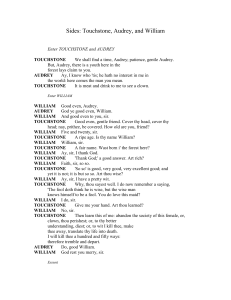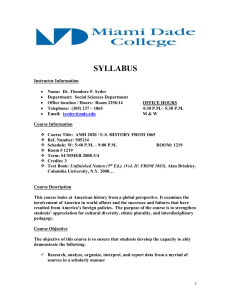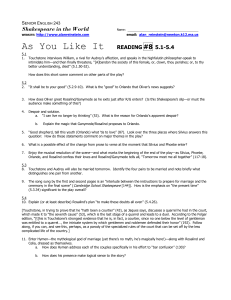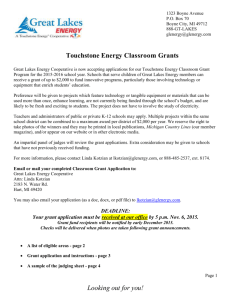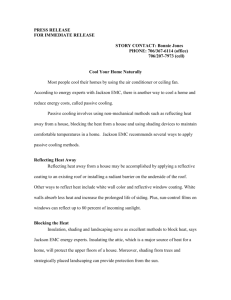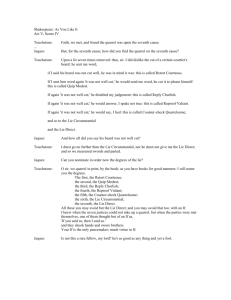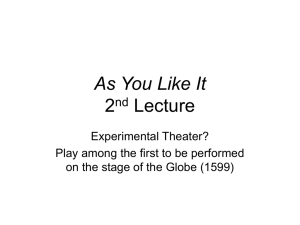Sarah Clinch
advertisement
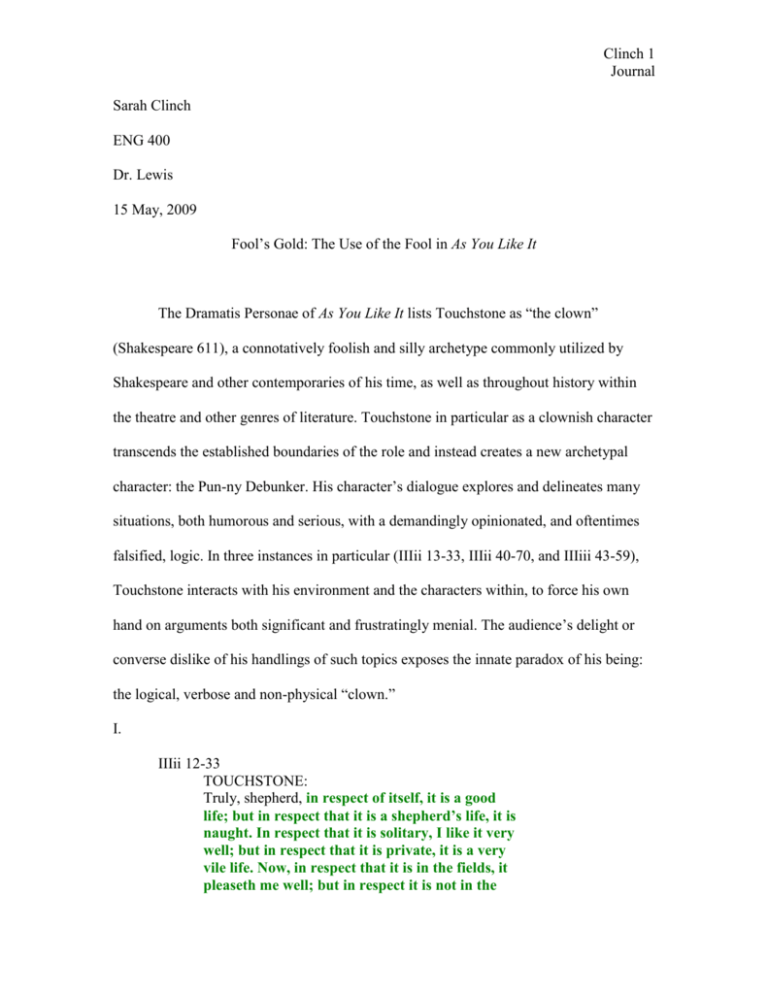
Clinch 1 Journal Sarah Clinch ENG 400 Dr. Lewis 15 May, 2009 Fool’s Gold: The Use of the Fool in As You Like It The Dramatis Personae of As You Like It lists Touchstone as “the clown” (Shakespeare 611), a connotatively foolish and silly archetype commonly utilized by Shakespeare and other contemporaries of his time, as well as throughout history within the theatre and other genres of literature. Touchstone in particular as a clownish character transcends the established boundaries of the role and instead creates a new archetypal character: the Pun-ny Debunker. His character’s dialogue explores and delineates many situations, both humorous and serious, with a demandingly opinionated, and oftentimes falsified, logic. In three instances in particular (IIIii 13-33, IIIii 40-70, and IIIiii 43-59), Touchstone interacts with his environment and the characters within, to force his own hand on arguments both significant and frustratingly menial. The audience’s delight or converse dislike of his handlings of such topics exposes the innate paradox of his being: the logical, verbose and non-physical “clown.” I. IIIii 12-33 TOUCHSTONE: Truly, shepherd, in respect of itself, it is a good life; but in respect that it is a shepherd’s life, it is naught. In respect that it is solitary, I like it very well; but in respect that it is private, it is a very vile life. Now, in respect that it is in the fields, it pleaseth me well; but in respect it is not in the Clinch 2 Journal court, it is tedious. As it is a spare life, look you, it fits my humour well; but as there is no more plenty in it, it goes much against my stomach. Hast any philosophy in thee, shepherd? CORIN: No more but that I know the more one sickens the Worse at ease he is; and that he that wants money, Means, and content, is without three good friends; That the property of rain is to wet, and fire to Burn; that good pasture makes fat sheep; and that A great cause of the night is lack of the sun; that He that hath learn’d no wit by nature nor art may Complain of good breeding, or comes of a very Dull kindred. TOUCHSTONE: Such a one is a natural philosopher. Wast ever in Court, shepherd? Touchstone’s dialogue with the shepherd Corin in Act III, Scene ii highlights Touchstone’s love of the language, and the love of twisting this language into sensical nonsense, or nonsensical sense (dependable upon the actor’s portrayal of the character as well as the audience’s comprehension of the logic put forth by the character). He dichotomizes several aspects of the country life in respect of aspects within the aspects. For instance, when dealing with the country life in terms of its publicity, Touchstone attends that, “in respect that it is solitary, I like it very well; but in respect that it is private, it is a very vile life” (As You Like It IIIii 14-6). Touchstone acknowledges two opposing (in his mind) ideals of the ‘publicity’ of the country life: solitary versus private. On one hand, the country man exists on his own, independent of anyone else; Touchstone finds this detail favorable. On another hand, however, the country man exists on his own, without any public display or attention (whether favorable or not); Touchstone finds this detail extremely negative. And so, the Fool has turned into a Debunker of life in the Clinch 3 Journal country (at least, an attempted Debunker) in his efforts to dichotomize the aspects of an aspect of country life. Such logic is boggling and almost pains the mind to follow. The ‘attempted debunker’ Touchstone alludes toward a defense of his logic through his own experiences in Court: he bases the relative fervor or pessimism of his feelings for country life on Court life. This method, while logical and substantial to him, crumbles into nonsense when scrutinized closely. Comparing country life to Court life provides a basis for understanding; however, the juxtaposition of country life with court life indicates the logical fallacies inherent in Touchstone’s argument. In Court, Touchstone no doubt wished for a more solitary life; surrounded by lords and ladies and other members of the ‘high society,’ he never was allowed a moment alone to himself. However, no matter how ardently someone smothered by society wishes to escape for a while, he never hopes for complete privacy: celebrities secretly in love with the spotlight will always crave attention from the paparazzi (even in extreme private moments). Therefore, Touchstone bases his judgments on the country life on his personal experiences and feelings within the Court life, a dangerous misplacement of circumstance. Corin’s conjectures contrasted to Touchstone’s directly preceding presumptions consider several logical and obvious observations which even Touchstone accepts, and accordingly deems the shepherd a “natural philosopher” (As You Like It IIIii 32). Through his remarks, including such gems as “that the property of rain is to wet, and fire to burn” (As You Like It IIIii 26-7), Corin proves more rational than his Fool-ish counterpart. Whereas Touchstone’s arguments stem from his experiences in the Court, applied toward the country life in a logical fallacy, Corin’s thoughts extend from his life Clinch 4 Journal and living in the country: a much more applicable train of thought than Touchstone’s. Through pairing the Court Clown with the Country Shepherd (or simpleton, as many of the Court would view him), Shakespeare invites audiences to question the value of the Court and its principles when critically viewing the country. The use of the Fool to convey this concept eases the audience into this line of reasoning, and offers a humorous look at a true clash of worlds as Touchstone attempts to debunk the country in terms of his experience in Court. II. IIIii 39-70 TOUCHSTONE: Why, if thou never wast at court, thou never Saw’st good manners; if thou never saw’st good Manners, then thy manners must be wicked; and Wickedness is sin, and sin is damnation. Thou art In a parlous state, shepherd. CORIN: Not a whit, Touchstone: those that are good Manners at the court, are as ridiculous in the Country as the behaviour of the country is most Mockable at the court. You told me you salute not At the court, but you kiss your hands: that courTesy would be uncleanly, if courtiers were Shepherds. TOUCHSTONE: Instance, briefly; come, instance. CORIN: Why, we are still handling our ewes; and their Fells, you know, are greasy. TOUCHSTONE: Why, do not your courtier’s hands sweat? And is Not the grease of a mutton as wholesome as the Sweat of a man? Shallow, shallow. A better inStance, I say; come. Clinch 5 Journal CORIN: Besides, our hands are hard. TOUCHSTONE: Your lips will feel them the sooner. Shallow Again. A more sounder instance, come. CORIN: And they are often tarr’d over with the surgery of Our sheep; and would you have us kiss tar? The Courtier’s hands are perfumed with civet. TOUCHSTONE: Most shallow man! Thou worms – meat, in respect Of a good piece of flesh, indeed! – Learn of the Wise, and perpend: civet is of a baser birth than Tar, - the very uncleanly flux of a cat. Mend the Instance, shepherd. CORIN: You have too courtly a wit for me: I’ll rest. Touchstone’s logic again foils him in the subsequent dialogue; his seemingly well-thought-through reason follows a thread of Courtly wisdom which, when scrutinized, fails to make sense (due to a fault at the beginning of the snowball-effect of logic). Touchstone decrees that because Corin never lived at Court, he “never saw’st good manners” (III.ii. 39-40), and because of his lack of manners his “manners must be wicked” (III.ii. 41). Touchstone remarks that “wickedness is sin, and sin is damnation” (III.ii. 42), thereby condemning the Country Shepherd for his existence in the Forest of Arden. Touchstone’s logic seems to follow a correct path from point A to point B; however, deducing damnation from roots in the country (roots dictated by destiny and therefore from God himself) wanes foolishly under closer logical cupellation (to sort the gold and silver pieces of wisdom from the lumps of coal and worthless pieces of rhetoric Touchstone presents). The argument disintegrates once the first step is crushed under the Clinch 6 Journal rhetorical pressure to present a correct line of reasoning. Clearly, manners cannot come from a life at Court only – good conduct stems from the situation one hails from, and Country life serves as well as the Court for teaching Godly courtesy. Because Touchstone assumes the Country life cannot nurture etiquette and that the Court only can preserve good behavior, he makes a logical misstep which completely defeats the rest of his argument against Corin. Touchstone, in his attempts to logically deduce that Country bumpkins are simpler and damned due to their life in Arden, fails even at his job as the Pun-ny Debunker, because his logic is not sound enough to create a failsafe argument. Corin once again proves himself more logical and presents a much better contention than Touchstone’s in the passage directly following the clown’s. He points out what Touchstone failed to recognize: that “those that are good / Manners at the court, are as ridiculous in the / Country as the behaviour of the country is most / Mockable at the court” (III.ii. 44-7). The fool cries for “instance, briefly; come instance” (III.ii. 51), asking for examples as to why the “courtesies” (III.ii. 49-50) of the Court are uncleanly in the Country, specifically kissing hands in greeting. Corin provides rationale several times in the conversation, but each time Touchstone waves away the evidence like a bothersome fly and calls for “a better instance” (III.ii. 56-7), “a more sounder instance” (III.ii. 60), and finally silences the logic by demanding that Corin “mend the instance” (III.ii. 67-8). Though Corin’s reasons why Courtly etiquette lacks appropriateness in the Country sustain his argument, Touchstone cannot see past his own conjectures and the inherent truth he somehow perceives within them. The Pun-ny Debunker once again has failed to quail before his more logical rhetorical opponent, in one way strengthening his Clinch 7 Journal own character by sticking by his guns, but in another vastly lacking in skills required for one of his profession. III. IIIiii 43-59 TOUCHSTONE: Amen. A man may, if he were of a fearful heart, Stagger in this attempt; for here we have no Temple but the wood, no assembly but hornBeasts. But what though? Courage! As horns are Odious, they are necessary. It is said, ‘Many a Man knows no end of his goods:’ right; many a Man has good horns, and knows no end of them. Well, that is the dowry of his wife; ‘tis none of his Own getting. Horns? Even so; poor men alone? No, no; the noblest deer hath them as huge as the Rascal. Is the single man therefore blessed? No: As a wall’d town is more worthier than a village, so Is the forehead of a married man more honourAble than the bare brow of a bachelor; and by how Much defence is better than no skill, by so much Is a horn more precious than to want. – Here Comes Sir Oliver. In another instance, Touchstone presents cuckoldry as a vastly superior option to the life of a bachelor. His evidence, including witty statements that “the noblest deer hath [horns] as huge as the Rascal” (IIIiii 52-3), lacks substance, sense, and the consideration that his a priori assumptions come from fallacy. Touchstone believes that “horns are Odious… [yet] necessary” (46-7), and clearly holds grave disdain for single men. His own situation interestingly runs parallel to his words, as he has only just met the woman he intends to hurriedly marry for marrying’s sake. As a lowly bachelor, he tries to escape his own damnation by redeeming his circumstances with the first girl he finds in Arden. Also, because of his clear contempt for the people of the forest, he feels no remorse in admitting his hopes for an extremely temporary husbandry. A short-lived contract with a Clinch 8 Journal shepherdess would suit him just fine and will supposedly save him from hypocrisy as he criticizes those men lacking luck to marry. By positing that the experience which comes from a relationship with a cuckold wife benefits more than the isolation of a single man’s existence, Touchstone fails to realize that the ends never justify the means. Settling for half only results in a lack of satisfaction in the long run, and so Touchstone reveals his character flaw by provisionally pairing with Audrey. As the Punny Debunker he creates logic which he must then fall prey to and follow to avoid duplicity. His shortsightedness keeps him from seeing the immorality and illogicality of accepting that a cheating wife would be better suited for a man than no wife at all, and leads him to marrying a woman without intention to remain hitched to her longer than he plans to stay in Arden. Touchstone’s clownish character truly takes a darker turn with this attribute; acting for the sake of covering his own ass, Touchstone exposes his talk first, think later personality. The Fool foolishly fulfills his professional duties in Shakespeare’s As You Like It. Touchstone fails to logically infer any truths in III.ii. and III.iii., as explored above. Even his adjusted role as the Punny Debunker falls apart, as his puns lack humor and his debunking skills require much more thought (not to mention sense). However, as a Shakespearean character, while he may fail at the duties prescribed by his professional career, he succeeds at transcending his role and creating his own personality and life. The many instances of false logic bring a sense of humanity to Touchstone; if he spoke with a quick wit, always proving some grand point through his puns and humor, he would seem blank and robotic and frankly uninteresting. Shakespeare’s genius with characterization particularly shines with the Fool of As You Like It. Though he does not have the qualities Clinch 9 Journal of the clown he is listed as in the Dramatis Personae of the play, nor the fool the other characters believe him to be, Touchstone is worth his weight in Fool’s Gold, because though his appearance may reflect the function of a courtly wit, his inner humanity is true and unique and separate from his outer clown. Clinch 10 Journal Works Cited As You Like It. The Riverside Shakespeare. 2nd ed. Boston: Houghton Mifflin Co., 1997. 403-434.
